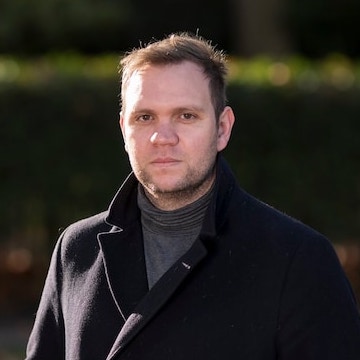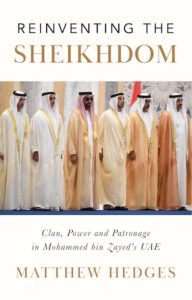Reinventing the Sheikhdom w/ Matthew Hedges
50 George Square
Edinburgh EH8 9JU
The Alwaleed Centre is delighted to be welcoming Dr Matthew Hedges for this special event which can be attended both in-person and online.
This event is available to attend both in-person and online. Refreshments will be available before the event.
Matthew Hedges’ expert focus on authoritarian regimes, takes us on a riveting journey exploring Mohammed bin Zayed’s regime and security strategy, illustrating the network of alliances that seek to support his reign and that of his family.
The Emirates’ political evolution has largely been accredited to Abu Dhabi’s crown prince, Mohammed bin Zayed. His reign has been characterised by the rise of the security apparatus and a micromanaged approach to governance. Mohammed bin Zayed’s strategy of fortification has focused on pre-empting threats from the UAE’s native population, rather than from expatriates or foreign actors. As a result, he has consolidated power, distributing its administration among his tribal and kinship allies. Mohammed bin Zayed has driven modernisation in order to strengthen his grasp on power.
Join us for this compelling examination of how MBZ has exploited personal networks in his drive for power in the UAE.
About the book
A compelling examination of how MBZ has exploited personal networks in his drive for power in the UAE.
Though the Arab Spring has reverberated through the Middle East, largely leaving a path of destruction, the relative calm in the United Arab Emirates has offered a regional roadmap for stability. Domestic changes since 2000 have significantly altered the country’s dynamics, firmly cementing power within Abu Dhabi. While Khalifa bin Zayed succeeded his father as emir of Abu Dhabi and UAE president in 2004, the Emirates’ evolution has largely been accredited to Abu Dhabi’s crown prince, Mohammed bin Zayed. His reign has been characterised by the rise of the security apparatus and a micromanaged approach to governance.
Mohammed bin Zayed’s strategy of fortification has focused on pre-empting threats from the UAE’s native population, rather than from expatriates or foreign actors. As a result, he has consolidated power, distributing its administration among his tribal and kinship allies. In essence, Mohammed bin Zayed has driven modernisation in order to strengthen his grasp on power.
Reinventing the Sheikhdom explores Mohammed bin Zayed’s regime security strategy, illustrating the network of alliances that seek to support his reign and that of his family. In an ever-turbulent region, the UAE remains critical to understanding the evolution of Middle Eastern authoritarian control.
About the speakers
Dr Matthew Hedges is an academic focusing on authoritarian regimes, with an emphasis on the monarchies of the Arabian Peninsula. He received his PHD in Security Studies and Authoritarianism from Durham University. In May 2018 he was unfairly arrested at Dubai International Airport on suspicion of espionage and sentenced to life imprisonment in the UAE for espionage in state security. The British Prime minister at the time and British Secretary of State for Foreign and Commonwealth Affairs criticized the verdict. After months of imprisonment, in November 2018 he was pardoned as part of the UAE’s National Day tradition and returned home to the UK to reunite with his family. Hedges and his wife Daniela Tejada, requested an independent inquiry into the way the Foreign and Commonwealth Office failed in negotiating Hedge’s release and proper treatment. Hedges’ courage and expertise provides us with a uniquely insightful approach to the UAE’s politics.
Dr Mira Al Hussein is Alwaleed Early Career Fellow in Authority in the Globalised Muslim World. She researches and writes extensively on topics related to state-society relations, citizenship, women and migrants in the Arab states of the Gulf. Mira’s research interests and area expertise broadly covers the Middle East, with a focus on the Arabian Peninsula. She is currently researching the migratory patterns and experiences of Arab Gulf citizens, and the formation of diasporic political agency in host countries. She will be teaching a course on Gulf histories, cultures and societies.
RSVP
